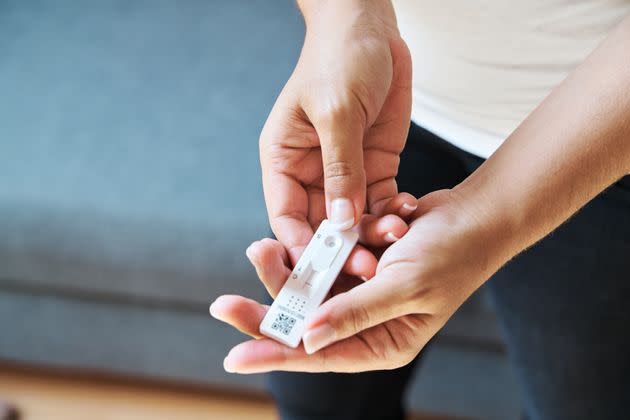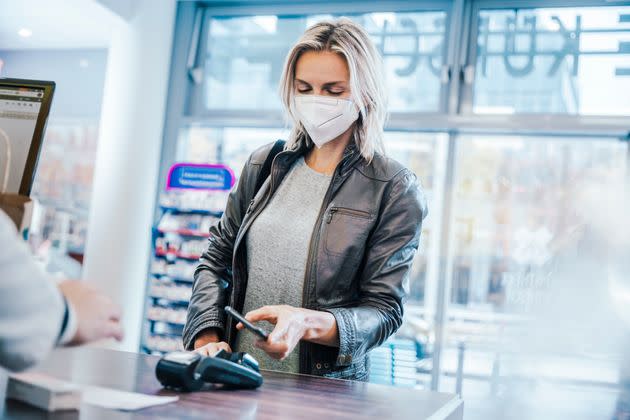Where Can I Buy At-Home Rapid COVID Tests, And When Should I Use One?
- Oops!Something went wrong.Please try again later.

If you’ve stopped by a drug store lately, you may have noticed there are now shelves of over-the-counter rapid COVID-19 antigen tests available for purchase. They’re cheap, they’re easy to use and they provide COVID-19 test results within minutes.
Health officials have said rapid antigen tests are a useful public health tool that can help us better screen for infections and slow the spread of the coronavirus. The tests aren’t as sensitive as the PCR tests most places have relied on throughout the pandemic, but infectious disease experts say the rapid tests are excellent at quickly identifying infected individuals who may be very contagious.
If you have symptoms and suspect you may have COVID, most infectious diseases doctors recommend skipping the rapid antigen test and going straight for the PCR. There are treatments that may help people at the onset of their illness, so if you’re symptomatic “you want a test that’s going to effectively diagnose illness with COVID and the antigen test is probably not that test. It’s best thought of as a test for being really contagious,” Sheldon Campbell, a pathologist, microbiologist, and professor of laboratory medicine at Yale School of Medicine, told HuffPost.
How do rapid antigen tests work?
Rapid tests scan for antigens (a protein located on the surface of the virus). PCR diagnostic tests look for the virus’s genetic material, or RNA.
The main difference between rapid tests and PCR tests is how sensitive they are. PCR tests are incredibly sensitive and can detect very tiny traces of virus. Rapid tests, on the other hand, are very insensitive — especially in people who don’t have symptoms.
Though they could miss small amounts of virus, they’re great at identifying large amounts. “You have to have quite a bit of virus to turn the antigen test positive,” Campbell said.
A large meta-analysis from March 2021 found that rapid antigen tests detected about 72% of symptomatic cases confirmed positive by a PCR test. The rapid tests were less sensitive with asymptomatic infections, catching on average about 58% of those cases.
“These rapid antigen tests, particularly the popular ones, are not good at detecting patients who are asymptomatically infected,” said Benjamin Pinsky, medical director of Stanford’s Clinical Virology Lab.
But this doesn’t mean the rapid antigen tests are useless ― and they might even be getting better. A December 2021 study found that BinaxNOW’s COVID-19 antigen test identified 87% of symptomatic cases and 71% of asymptomatic cases when performed by health care workers in a controlled setting. Of course, that number is likely to go down a bit when conducting them at home because of issues like user error. Other studies have found that rapid antigen tests catch most of the cases (93%) that have a solid chance of being transmissible. The rapid antigen tests do this by their ability to identify large viral loads, which indicate a person could be pretty contagious. (People with smaller viral loads are generally believed to be less contagious than those with high viral loads.)
“Someone who is antigen-negative but PCR-positive is almost certainly less contagious than someone who is antigen-positive and PCR-positive,” said Campbell, adding that further research is needed to determine how infectious a person is who produces a negative rapid test but a positive PCR test.
What kind of rapid test should I buy?
Each kit often comes with two at-home tests. When shopping, look for a brand that has been authorized by the Food and Drug Administration. These include:
Abbott’s BinaxNOW, which you can get from places like CVS for $23.99, Walgreens for $23.99, Walmart for $14, Sam’s Club for $14, or RiteAid (prices vary). You can also order through the company’s website for $23.99.
Quidel QuickVue, which you can buy from places like Walgreens for $23.99, CVS for $23.99, Walmart for $24.95 and other pharmacies. You can also grab a kit off Amazon.
iHealth’s COVID-19 Antigen Rapid Test, which you can buy on Amazon for $17.98. You can also purchase kits from the company’s website for $13.98.
On/Go’s COVID Rapid Test Kit, which you can purchase from Walgreens for $23.99, Amazon for $24.88, Walmart for $29.99 or even Best Buy for $29.99. The company’s website also sells kits for $29.99.
Ellume, another brand that was authorized by the FDA, is another option. However, the FDA recalled more than 2 million Ellume tests in November due to higher rates of false positives. The tests affected were those manufactured between Febraury 24 and August 11, and those distributed between April 13 to August 26.
Many of these kits tend to sell out quickly due to high demand, so it may be worth keeping some handy in your medicine cabinet (more on storing them in a minute) or signing up to be notified when more kits are in stock.
If you’re sick or don’t want to be around others, many retailers offer curbside pickup. Lastly, experts recommend avoiding buying from unverified sellers, resellers or via social media. That’s because, of course, there are fraudulent test kits out there.

When should I use rapid antigen tests?
The question of when and how we should be using rapid antigen tests is heavily debated in the medical community. Many health experts say the tests aren’t sensitive enough to pick up on all infections. Others argue that rapid tests identify the most useful thing: people who may be highly infectious.
Campbell said the best time to use a rapid test is right before you’re around a large group of people.
“By far the most important time to use an antigen test is not three to five days after you did something risky to find out if you’ve already suffered the consequences — it’s right before you do something risky so you aren’t the one who spreads disease there,” Campbell said.
If you want to test yourself, the most prudent thing to do is take a PCR test a few days after being exposed or doing something risky. But they’re harder to come by. If you’re opting for a rapid antigen test ― particularly before you’re visiting someone who is high-risk for severe COVID ― swab yourself as close to your visit as possible, Campbell said.
If you have symptoms, like a cough or fever, you should take a PCR test, not a rapid antigen test, Pinsky advised. At this point, you really want to know if it’s COVID, since there are treatments like monoclonal antibodies that may reduce the severity and duration of the infection.
Pinsky said we shouldn’t be using rapid antigen tests to rule out infections. Because these tests aren’t that sensitive, especially with asymptomatic individuals, “a negative result doesn’t mean very much,” Pinsky said.
According to Pinsky, another best use for them is in congregate living settings, such as a dormitory or long-term care facility, where they can identify an ongoing outbreak in which individuals are at different points in the infection cycle — some would be recently exposed, others would be newly infected or symptomatic and have detectable levels of virus. This is how other rapid antigen tests, like those used to detect norovirus, are traditionally used, Pinsky explained.
How to interpret the test results
Access to quick PCR tests remains an issue, whereas rapid tests are available at pharmacies. That said, they can be expensive; people are now calling on the government to intervene and offer them to households for free. Especially since, in many cases, a rapid antigen test is the easier choice.
If you keep some on hand, keep in mind that these tests have a shelf life ranging from six months to a year. You can store them until the expiration date printed on the box, but don’t use them beyond that.
If you don’t have symptoms but take a rapid antigen test for screening purposes and test negative, it’s not a guarantee you’re in the clear. It is, however, an indication that even if you were infected, your viral load probably would be too low to be transmissible. There is always the chance that you have small amounts of virus that the test just didn’t pick up, or that you could become contagious in a couple of days. This is why so many rapid antigen tests recommend retesting the next day.
If you have symptoms and get a negative rapid test result, tread carefully, Pinsky said. Though it’s generally believed that people who produce a negative rapid antigen test aren’t as contagious, since they have smaller viral loads, there’s still a chance they could be infected and shedding small amounts of the virus, which can then be passed on. It’s not yet known exactly if and how contagious a person with a small viral load may be.
Finally, if you take a rapid antigen test and get a positive result, that’s a pretty sure sign you’re infected, though as is the case with any diagnostic test, false positives do happen.
“If you’re antigen-positive, you’ve got quite a bit of virus and are probably pretty contagious,” Campbell said.
This story has been updated. Experts are still learning about COVID-19. The information in this story is what was known or available as of publication, but guidance can change as scientists discover more about the virus. Please check the Centers for Disease Control and Prevention for the most updated recommendations.
HuffPost may receive a share from purchases made via links on this page. Prices and availability subject to change.
This article originally appeared on HuffPost and has been updated.



